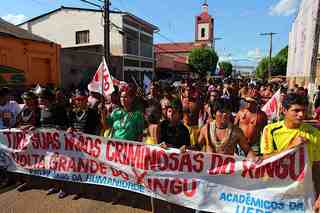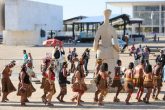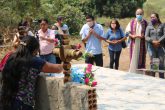Report No. 928: Symbolic Protest marks signing of the Belo Monte concession
Indigenous leaders protested today (26/8) before the Presidential Palace against the signing of the Decree awarding the contract for the Belo Monte Hydroelectric Plant to the Norte Energia Consortium, during the reinauguration session of the Palace [which has just completed renovations]. During the ceremony, they held banners repudiating the federal government’s action in destroying the environment seeking development at any cost. They also taped their mouths, symbolizing the total lack of dialogue so far between the state and the communities that will be affected by the project.
Death warrant Marcos Apurinã, coordinator of the Coordination of Indigenous Organizations of the Brazilian Amazon (Coiab), stressed the significance of the signing of this Decree. "It is an act of violence against indigenous peoples, riverine peoples, peasants and the general population. Lula is signing the death warrant of indigenous peoples throughout the country. This is dramatic for us!" He said.
Marcos Apurinã, coordinator of the Coordination of Indigenous Organizations of the Brazilian Amazon (Coiab), stressed the significance of the signing of this Decree. "It is an act of violence against indigenous peoples, riverine peoples, peasants and the general population. Lula is signing the death warrant of indigenous peoples throughout the country. This is dramatic for us!" He said.
For Marcos, the sense is that indigenous peoples are not in their own country. "Abroad, this government is presented as an example. But here at home, at least for indigenous peoples, it is not”. Also according to the Apurinã leader, it is a tragedy to see that this government misled the indigenous peoples in many respects. "But the indigenous movement will continue its struggle, more than 500 years of resistance and we are not going to stop now!" He concluded.
Manifesto
This week various social movements, indigenous organizations and indigenist NGOs sent out a clear repudiation of the signing of this contract. In the document, the entities declare that the action by the government is one more act of "outrageous affront to international human rights conventions, to Brazilian legislation and the Constitution of the country."
In the view of these organizations, "this consolidates a process that resussitated a terrifying authoritarianism on the part of the government, which pressed the Federal Court to overturn without any assessment of the legal arguments three injunctions granted by the Federal Court against the project and the project auction, coerced prosecutors of the Ministério Público Federal through open threats by the Attorney General of the Union, and endorsed a project that will cost over 19 billion dollars – the bulk being public funds taken from the BNDES and pension funds – without any guarantee of economic viability, representing a serious threat to the treasury”.
The various struggles against Belo Monte
Several demonstrations, meetings, memoranda of repudiation have been made and the federal government continued with the approval actions for the Belo Monte project, without listening to scientific experts, social society or the indigenous peoples and traditional communities. Earlier this year, in Brasilia, there were two major public events, a major public march against the auction of the dam with the participation of indigenous peoples, leaders of social movements, river communities and representatives of nongovernmental organizations (NGOs).
 During the first week of August, in Altamira, Pará, a broad mobilization was conducted "In defense of the Xingu: against Belo Monte”. About 500 people, including indigenous and riverine peoples, farmers, fishermen and the urban communities, participated in discussing the consequences of this major project. In the final letter generated at the event, the participants set themselves against all major projects that cause death and destruction. "Still alive in our memory is the destruction and death caused by major projects implemented by authoritarian governments of the military dictatorship, such as the construction of the Trans[amazonian highway] (BR 230), the federal highways BR 174, 364 163, and the Tucurui and Balbina hydroelectric dams. Indigenous peoples and traditional communities were hit hard. People like the Arara, Parakanã, Waimiri Atroari reached the brink of extinction". In the Free Land Camp, held between August16th and 19th in the municipality of Campo Grande, in the state of Mato Grosso do Sul, approximately 800 Iindigenous persons also demonstrated indignation over the government’s insistence on continuing with the process that involves the construction of Belo Monte.
During the first week of August, in Altamira, Pará, a broad mobilization was conducted "In defense of the Xingu: against Belo Monte”. About 500 people, including indigenous and riverine peoples, farmers, fishermen and the urban communities, participated in discussing the consequences of this major project. In the final letter generated at the event, the participants set themselves against all major projects that cause death and destruction. "Still alive in our memory is the destruction and death caused by major projects implemented by authoritarian governments of the military dictatorship, such as the construction of the Trans[amazonian highway] (BR 230), the federal highways BR 174, 364 163, and the Tucurui and Balbina hydroelectric dams. Indigenous peoples and traditional communities were hit hard. People like the Arara, Parakanã, Waimiri Atroari reached the brink of extinction". In the Free Land Camp, held between August16th and 19th in the municipality of Campo Grande, in the state of Mato Grosso do Sul, approximately 800 Iindigenous persons also demonstrated indignation over the government’s insistence on continuing with the process that involves the construction of Belo Monte.
In meetings with the bishop of the Xingu, Dom Erwin Kräutler, President Lula stated that he would not shove the Belo Monte project "down the throats" of the indigenous peoples, river communities and peasants. However, this is exactly what´s happening now.
The indigenous peoples do not agree with Belo Monte and insist, as expressed in the last paragraph of the Manifesto by their own words. "The signing of this decree will not extinguish the resistance of indigenous riverine and small farmers who are fighting for their lives in the Xingu, and for the life the river itself and the forests, which is for them and for us: the guarantee of the future."
Ministry of Justice suspends demarcation of Guarani lands in Santa Catarina
Defending private interests to the detriment to the originary rights of indigenous peoples, the justice minister, Luiz Paulo Barreto, suspended the declaratory orders of the indigenous lands Morro Alto, Piraí, Tarumã and Pindoty in the municipalities of São Francisco do Sul and Araquari in Santa Catarina. They are traditional lands of the Guarani Mbyá.
With judicial actions opposing the demarcation of indigenous lands, landowners and entrepreneurs managed to obstruct the demarcation process of these lands. About 300 people have filed suit, represented by the Association of Owners Interested in Property in Indigenous Areas in Northern SC (Apis) and the Federal Court judge of Joinville upheld the action, suspending the effect of the orders signed by then-Justice Minister Genro in 2009.
Adriano Guarani, an indigenous representative of one of the affected communities, expressed his sadness over the repeal of the Decree. "This setback is a political question. Here in the region, the entrepreneurs, producers, even the local governments do not want demarcation of indigenous lands! We do not understand this action taken by the minister, because we trusted him and now he does this”, he emphasized. According to Adriano, there are more than 500 people who will be affected and will have no place to live and no place from which to draw their sustenance. "We are in mourning, but we need to respond, we will organize a demonstration of repudiation because it cannot continue like this!" He concluded.






